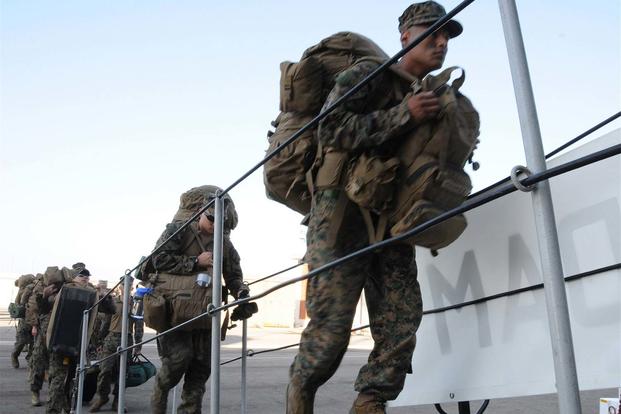Marine Corps leaders badly want their troops aboard an amphibious ship patrolling the African coast -- even if that ship isn't American.
Senior officials are in talks with multiple NATO nations about the logistics of putting a company-sized element of Marines aboard an allied ship to provide presence, patrol hot spots and conduct theater security cooperation missions with African militaries, Military.com has learned.
It's part of the Allied Maritime Basing Initiative, launched in 2015 as a stopgap measure to maintain presence in the European theater amid a shortage of U.S. amphibious ships. In tests, Marines spent time aboard Dutch, Spanish and French ships, and an MV-22 Osprey crew embarked aboard a Spanish amphib.
In an interview, the commander of Marine Corps Forces Europe and Africa, Maj. Gen. Niel Nelson, said the command is working through a cost analysis for putting Marines aboard an allied ship for a lengthy mission -- 30 to 60 days -- for bilateral and theater security cooperation exercises.
Another senior official, Col. Martin Wetterauer, commander of the 8th Marine Regiment, said the likely destination of the deployment would be the Gulf of Guinea, a region off the coast of West Africa known as a hotbed for piracy.
"There are willing partners in NATO that have available amphibious shipping as long as we can partner with them on the cost to put Marines along with their marines on that ship," Nelson told Military.com. "There are opportunities along the African coast to do bilateral engagements. We already fly down and do these engagements, but this would be a more economical way to sustain ourselves down there for a longer period of time."
With U.S. amphibious ships committed around the globe, military officials have been pondering creative ways to fill the shipping gap in the Gulf of Guinea.
In February 2015, Navy acquisition chief Sean Stackley said the service's new seabasing platform, the Expeditionary Mobile Base Lewis B. Puller, might be stationed in the region. And in 2016, Lt. Gen. Robert Walsh, commanding general of Marine Corps Combat Development Command, told Military.com that other ship classes, including logistics ships and seabasing platforms, were being assessed for retrofit to carry Marines for Africa patrols.
The Corps' rotating crisis response task force for Africa, a land-based force created in part to close the amphibious shipping gap in the region, is an imperfect solution to the problem, officials have said.
"The Marine Corps is designed as a maritime force. We're Marines. We belong on ships," Lt. Col. Bradford Carr, then an operations officer for the task force, told a think tank audience during a post-deployment debrief. "So being able to have that is essential."
Nelson was positive: The Africa allied deployment will happen, though both the U.S. and the partner nation have to work through variables of cost, timing, ship class and country.
"I think once we solve the money piece, we have to work with the other variables to come up with a solution," he said. "But I tell you, we have a lot of good people working it, both with the Marines and the countries. They're all enthusiastic; we're just working through those variables now."
And if all goes well, a deployment this year could lay the groundwork for others to follow, should the shortage of U.S. amphibious ships persist. There are now 31 amphibious ships; Navy and Marine Corps leaders have called for at least 38, and as many as 50 amphibs to fulfill current missions.
"Our U.S. Navy, if the ships were available right now, we'd definitely use them. But they're committed throughout the world," Nelson said. "But in lieu of that, this is a great opportunity to get after it."
-- Hope Hodge Seck can be reached at hope.seck@military.com. Follow her on Twitter at@HopeSeck.





























